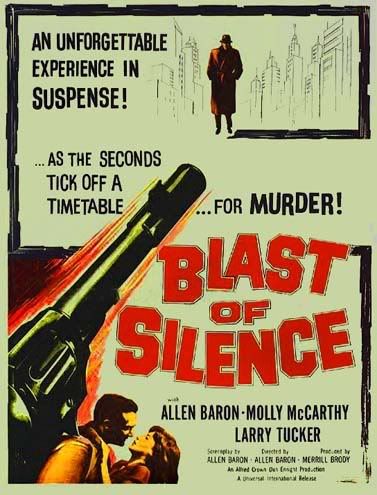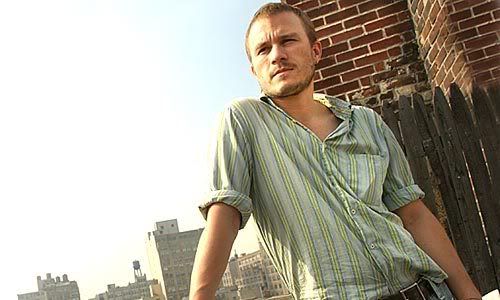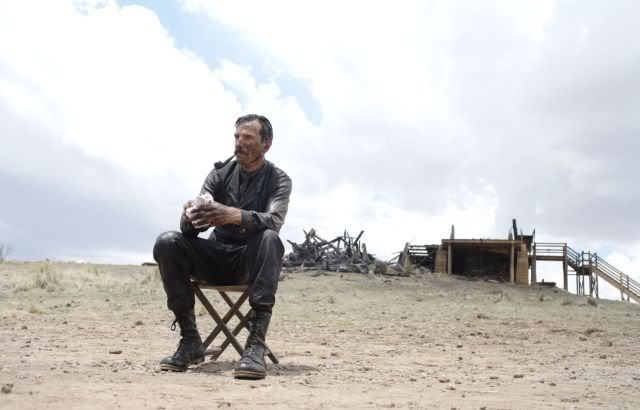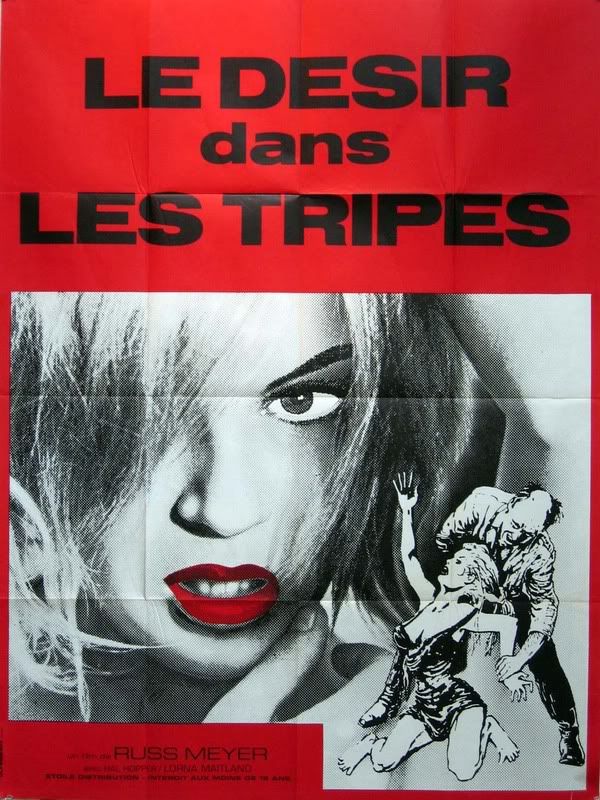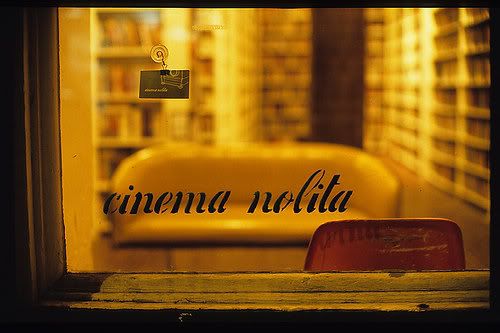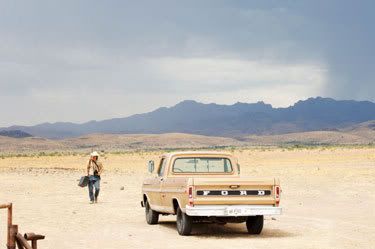
You heard me right. Not some wussified top 10, but a top 15. Why am I doing this, you may ask? Because it's my blog, and I make the rules. No, in all seriousness, 2007 was a fantastic year for cinema. Most years, where for the first eight months of the year, going to the theater is about as appealing a notion as smoking a cigarette in a wading pool filled with lighter fluid, then they cram all the worthwhile ones into December January for Oscar season. This year, as if eerily prophecizing that this year's Academy Awards ceremony will consist of Jon Stewart making jokes in an empty auditorium, it seemed like every other week this year, something was playing at the movies that I absolutely had to go rush out and see, and nine times out of ten, my expectations were exceeded. Truth be told, I could have crafted a pretty darned solid "best of" list in mid-October.... and this is coming from a guy who still somehow didn't manage to get out to see
The Assassination of Jesse James by the Coward Robert Ford, Margot at the Wedding, Into the Wild, Eastern Promises or
Evan Almighty (yes, I am kidding about the last one.) Much the same way that Ellen Degeneres honored the nominees, rather than the winners, at last year's Oscars ceremony, it seem's that 2007 honored the summer releases, the animated cartoons, the shlockers and slashers (or at least those advertised as such) dumped out in March and April, and the plucky newcomers as well as the seasoned auteurs. Ladies and gentlemen, without further ado, here are the best films (in my humble opinion) of 2007.
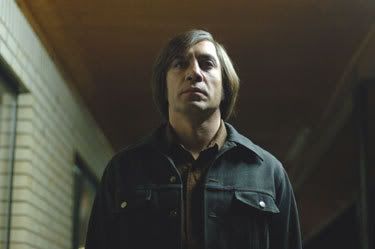
1. No Country For Old Men (Joel and Ethan Coen)Joel and Ethan Coen are back again, showing cinema's true believers like myself why we fell in love with their movies in the first place. Taking place in the wind-swept deserts of Texas, we have, in true Coen fashion, a whole lot of trouble and anguish occurring over "a little bit of money." Josh Brolin is simply fantastic as Lewellyn Moss, an unremarkable man flung into an uncanny situation, and Tommy Lee Jones is heartbreaking as an elderly sheriff who wants to be a John Wayne but knows in his heart that he doesn't have it in him. Javier Bardem's Anton Chigurh, of course, is destined to enter the pantheon of great cinematic villains, less a man than a pure, unstoppable harbinger of death. It's a genre deconstruction - I saw a lot of people walking out scratching their heads when the end credits rolled - but at the same time it's one of the finest examples of the thriller genre (with pinches of the western and film noir) ever created. If this movie had been made exactly the same, shot for shot, in 1980, which is when the story takes place - people would be referencing it when they say "they don't make 'em like they used to."
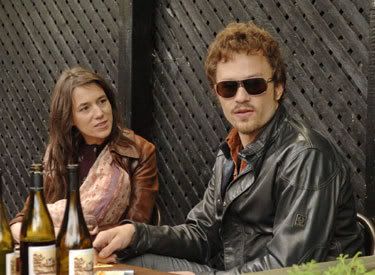 2. I'm Not There (Todd Haynes)
2. I'm Not There (Todd Haynes)2007 was a good year for habit-breaking in cinema.... and one of the most irritating habits of recent years is the emergence of the "Paint By Numbers" musician biopic. Unlike recent films which explain that Ray Charles, Johnny Cash and Edith Piaf all basically lived exactly the same life, Todd Haynes portrait of Bob Dylan is a kalidescopic visual feast of truth, fiction, speculation and myth. In addition to the much-covered stunt casting of six actors of varying age, gender and race to play Mr. Zimmerman, Haynes switches seamlessly back and forth between the filmic styles of D.A. Pennebaker, Frederico Fellini, Sam Peckinpah,
A Hard Day's Night and A&E's
Biography. He's a smart storyteller who understands that not only is Dylan so mythical he's damn near close to being the Billy the Kid of the 20th century, but that there are so many different myths, and he's remembered for different things by different people .... he's like Billy the Kid, Pecos Bill, Paul Bunyan and Johnny Appleseed all rolled into one. Not only could one actor not do the man justice - neither could one "regular," linear movie.
 3. Zodiac (David Fincher)
3. Zodiac (David Fincher)Calling Fincher's most recent venture a procedural is like saying Charles Foster Kane was somewhat ambitious. It's not a procedural, it's THE procedural. Like his protagonists, who feverishly obsess over what many may consider the boring nitty-gritty details -handwriting samples, fingerprints, codes, and ciphers - so does Fincher, whose careful anthropologist's hand we feel on every detail of the film, from the tasteless sideburns and big lapels to the washed-out,
Doy Day Afternoon/
All the President's Men-styled cinematography. The only difference is our protagonists (real-life newspapermen Robert Greysmith, Paul Avery, and Police Inspector David Toschi, played wonderfully by Jake Gyllenhaal, Robert Downey Jr. and Mark Ruffalo) will never be satisfied until they catch the Zodiac Killer (and if you know your history, you'll know they never do), but as the audience, we are more than completely happy to be taken along for the ride. And I know I'm not the first one to say this, but I'm damned if I'm ever going to be able to listen to Donovan's "Hurdy Gurdy Man" in my car ever again.
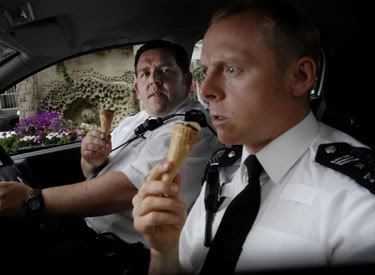 4. Hot Fuzz (Edgar Wright)
4. Hot Fuzz (Edgar Wright)Edgar Wright, Simon Pegg and co. continue to show those
Date Movie guys how parodies are done (and by the looks of their next film,
Meet the Spartans, it seems they haven't learned a thing.) As if the concept of a no-holds-barred, adrenaline-fueled thrill-ride of a buddy cop action movie set in a picturesque little English village wasn't funny enough,
Hot Fuzz also tips its hat to Agatha Christie and the tradition of the British rural mystery, treads much more delicately and hilariously on the subject of hetero man-love than
Chuck and Larry could ever hope to, and is truer to the spirit of the original
Wicker Man than that abominable Nicholas Cage remake. Dare I admit I actually liked this better than
Shaun of the Dead? I'm not even sure I can believe it myself. I'll have to watch them both back to back and get back to you on that.
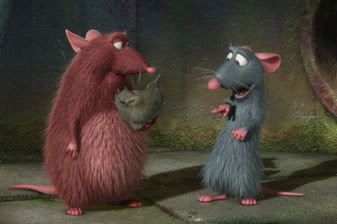 5. Ratatouille (Brad Bird)
5. Ratatouille (Brad Bird)Brad Bird continues to make magic, proving once again that he is the greatest living auteur of animation in these United States. When I call
Ratatouille a feel-good movie, it's not to lump it in with twaddle like
The Great Debaters, it's because I went to see it on a somewhat bummerific day, and walked out of the theater feeling like a million bucks. It's a rare breed of children's animated films that is devoid of ass jokes, Smash Mouth songs and pop culture references that are dated before they hit the screen, but instead respects the intelligence of its audience, trusting that kids will get the joke and invest in the story. It's a celebration not just of food, but of taste, and of artistic triumphs, with a great message for people of all ages: that with enough determination and faith in oneself, anyone can become a great artist. It's very rare that I say this about a movie I didn't personally grow up with, like
Dumbo or
Star Wars, but I can't wait to have kids so I can show
Ratatouille to them one day.
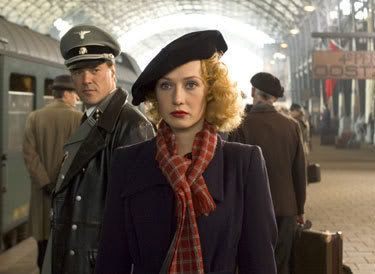 6. Black Book (Paul Verhoeven)
6. Black Book (Paul Verhoeven)Verhoeven's best film since
Robocop is an audacious, bold, and utterly compelling masterpiece. Were it not for
No Country For Old Men, I would be tempted to call this film the year's best genre decon- reconstruction. The storytelling of this picture, the twists and turns, the double-crosses and the cliffhanging suspense comes right out of the Michael Curtiz and Howard Hawks espionage movies of the 40's and 50's. But on the other hand, Verhoeven eschews simple notions of good and evil for a portrait of a much more complex and multi-faceted worldview - a rare thing in movies about the Nazis, especially "entertaining" ones. Also true to the Verhoeven form the movie is filled with the very best kind of T&A - the kind that is thought-provoking as well as titillating. You can keep your
English Patients, your
Cold Mountains and your
Atonements - I like symbolically significant scenes of pubic hair painting in my sweeping war epics.
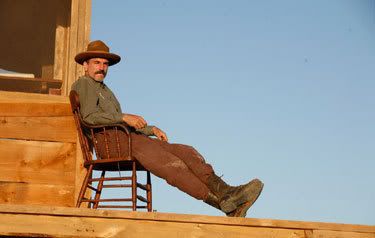 7. There Will Be Blood (Paul Thomas Anderson)
7. There Will Be Blood (Paul Thomas Anderson)While I don't think P.T. Anderson's most recent opus is quite up to the standard of his last three films (which, to recap, are the "everyone seems to love it, yet it's still somehow underrated"
Boogie Nights, the "so many jackasses claim it's overrated, that it's actually underrated"
Magnolia, and the just plain criminally underrated
Punch-Drunk Love), it is still a great film, and the fact that it has shot to the top of so many critics best-of-the-year lists gives me immense joy, if only for the fact that I think it's remarkable that such an odd, elusive, and "analytically angry" film can gain such widespread acceptance. Daniel Day-Lewis gives what is without a doubt in my mind the finest performance of the whole year as Daniel Plainview, bloodthirsty, brutal, and black-hearted American Capitalist. Equally impressive is Paul Dano, whose portrayal of skeevy false prophet Eli Sunday was one of the biggest surprises of the year, and I'd be tempted to call him the finest young actor of his generation. When I call this film Kubrickian it's not to accuse Anderson of imitation, but rather emulation:
There Will Be Blood is as good at peering into the dark heart of the human soul as the films of the late, great Mr. K.
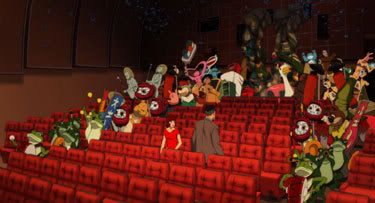 8. Paprika (Satoshi Kon)
8. Paprika (Satoshi Kon)Japanese anime maestro Satoshi Kon dives deep into the human subconscious here and invites us to go swimming with him in our own lucid dreams. Kon seems to cover it all in one beautiful, fluid, feverish 90 minutes: the similarities between dreams and cinema, limits and of technology and the dangers of its misuse, and the relentlessness of human beings to try and put a harness on the parts of their brain we have no control over. What if a device was created that allowed us to tape, play back, rewind and freeze frame our dreams? What if the misuse of such a device caused our dreams to spill over into reality, blurring the lines between the two? Kon is not so much seeking the answers to these, but using animation to beautifully illustrate the questions themselves. Whether you claim to love anime or to hate it, you owe it to yourself to check this one out.
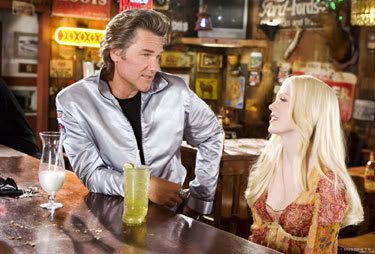 9. Death Proof (Quentin Tarantino)
9. Death Proof (Quentin Tarantino)Contrary to popular opinion, I felt that
Grindhouse was a wonderful treat for audiences who went out to see it. Ultimately, though, both films are better viewed separately and on their own terms, and the best thing to come out the whole package was the extended version of Tarantino's
Death Proof. The irony here is is that when I first saw
Grindhouse, I really didn't care for Tarantino's film... I just found it way too jarring to try and readjust my brain to to pay attention to a dialogue-heavy automobile giallo after just having sat through Robert Rodriguez's deliriously nutty, bullets-and-pus zombie extravaganza
Planet Terror. This may be exactly Tarantino's point: grindhouses and drive-ins of the 70's would often pair something like
Erotic Nights of the Living Dead with a more meditative, yet still borderline-exploitive film like
Two Lane Blacktop or
Rolling Thunder, and while you might have enjoyed one more at the time, the other one might very well be the film that stuck with you years later. Even so, I still retain that the extended cut of
Death Proof is as good as the film gets, giving us more on the psychology of Stuntman Mike (who is easily Kurt Russell's best creation since his heyday with John Carpenter), and presenting a fascinating study of male predatory nature in general. Part feminist statement, part action, part horror, but all cinema.
 10. Bug (William Friedkin)
10. Bug (William Friedkin)Cruel irony is up to his old tricks again. William Friedkin comes out with his best film since
The Exorcist, and it is distributed by Lion's Gate Films, who put out a trailer that might as well have been cut by the same guy who made that joke trailer for
The Shining, released it in the dog days of late spring with a handful of their other junky horror movies, and leave it to wither and die. It's sad, because
Bug is a great film, a searing psychological horror that leaves it up to the audience to decide what to think. Are there tiny, microscopic bugs eating the protagonists' flesh, or are the protagonists just bat-shit insane? Ashley Judd earns my respect as the best actress of the year for her devastating performance as Agnes White, a desperately lonely, drug-abusing, grieving mother who gradually transforms into a paranoid lunatic. At its heart the film is not so much a scare flick about the titular creatures as it is a beautiful, demented love story: he's a former military human guinea pig looking to spill open his heart about surgically-implanted, radio-transmitting aphids, and she's so fragile beneath her tough exterior that she'll humor him to the point of starting to believe it herself, just as long as she can keep him by her side and not have to be alone. Whoever said love was easy?
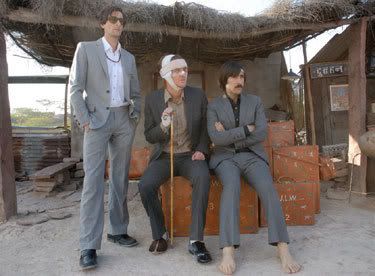 11. The Darjeeling Limited (Wes Anderson)
11. The Darjeeling Limited (Wes Anderson)Anderson's latest picks up, thematically, where
The Royal Tenenbaums left off, as three estranged brothers take a "spiritual journey" across India. As well as being a heartfelt film on the notion of family, and a gentle social commentary,
Darjeeling is also a crypic self-criticism on Anderon's part - a flipside of the coin to
The Life Aquatic, which seemed like a bitter attack on his audiences and critics. One of the most common cases people make against Anderson is his obsession with contrived minutia, much like Jason Schwartzman's character, Jack is. In many ways, this is true, but dammit if that dark chocolate doesn't taste so good right after having sex with a strange woman to exactly the right song on your iPod. Of course, once the brothers are kicked off the train, and lose the help of their trip-planning assistant, their world opens up: as Anderson seems to be declaring that his is too. Despite the obviousness of the metaphor, it is truly a glorious moment when the brothers throw away their baggage - and Anderson seems to have done the same with his (not that his baggage really bothered me to begin with), making the ending of
The Darjeeling Limited one of the year's most upbeat and uplifting.
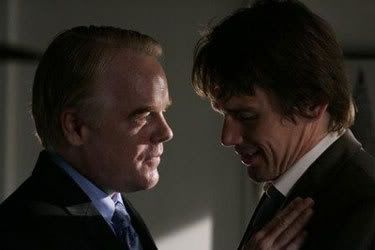 12. Before the Devil Knows You’re Dead (Sidney Lumet)
12. Before the Devil Knows You’re Dead (Sidney Lumet)God bless Sidney Lumet. The guy's a thousand years old and he still made a film that rocked me to my very core.
Before the Devil Knows Your Dead is easily the bleakest film on this list. Whereas the Whitmans of
The Darjeeling Limited find simultaneous happiness, coexistence and independence, the Hanson family in this film collapses into itself like a black hole when two brothers - sniveling wimp Hank (Ethan Hawke) and conniving rat-bastard Andy (Phillip Seymor Hoffman) get the brainy idea to rob a jewelery store owned by their parents. Things of course go wrong, resulting in one of the most screwed-up family dramas in recent memory. I don't think either
Darjeeling or
Devil is "wrong" in its presentation of familial relations - they merely have drastically different things to say about how how we respond to those who were always closest to us.
 13. Persepolis (Marjane Satrapi & Vincent Peronnaud)
13. Persepolis (Marjane Satrapi & Vincent Peronnaud)What a splendid year 2007 was for animated movies! In addition to new offerings from Brad Bird and Satoshi Kon, last year welcomed comic book artist and first-time director Marjane Satrapi, whose autobiographical film, based off of her series of graphic novels, is a rare animated treat for adults. It's ironic that it took a cartoon to put a human face on a geographical region that the average American considers to be simply full of terrorists to get audiences in this country to actually sit up and pay attention. This is not a soapbox film, it is a story of human beings, gorgeously rendered in a unique style completely alien to that of Disney or Japanese anime. It's a treat for animation fans, but moreso a film that should be viewed by all Americans.
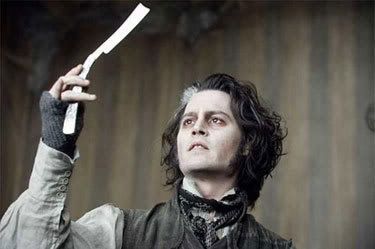 14. Sweeney Todd: The Demon Barber of Fleet Street (Tim Burton)
14. Sweeney Todd: The Demon Barber of Fleet Street (Tim Burton)As a young filmmaker, Tim Burton was my idol throughout my early teens, although it ought to be said that in much of his work post-
Ed Wood, any real meaning seemed to drown in the director's obsessions: lonely manchildren, goth fetishism, and faux-darkness masking a cutesified blandness. Seeing
Sweeney Todd made me feel like I'm sure every longtime Red Sox fan felt when they won the World Series... having stuck by his side all along, going to see every one of his movies, Mr. Burton finally delivered.
Sweeney Todd shows Burton at his most gleefully misanthropic since
Batman Returns, as he meticulously constructs a monochromic vision of Victorion London and proceeds to paint it that especially bright shade of Hammer Horror blood red. I can't claim to have ever seen a stage version of musical before I bought my ticket, but as a longtime Tim Burton admirer, I wasn't let down.
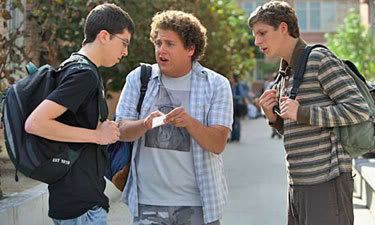 15. Superbad (Greg Mottola)
15. Superbad (Greg Mottola)Despite its screenplay containing an amount of curse words that rivals that of
Goodfellas, this destined-to-be cult favorite is a sweetly innocent tale that lends god-like power to the virginal teenage penis. While detractors mocked the film's implausibilities - nerds can't just show up at a party and start talking to the babes, and cops never, ever act like that - I found that the beauty of the film was in what I call the "little moments." The way that they botch up their pick-up lines when talking to members of the opposite sex, and humiliate themselves due to an inability to hold their liquor - it reminds me so much of me and my friends when we were in high school that at times I had to look away from the screen with embarrassment. That's how good
Superbad is. From its pulsing 70's funk soundtrack to its honesty about male dork-on-dork emotional attachment when there are no female to be had -
Superbad is the real deal. I laughed, I cried, and I laughed some more - now really, what more can you ask?
